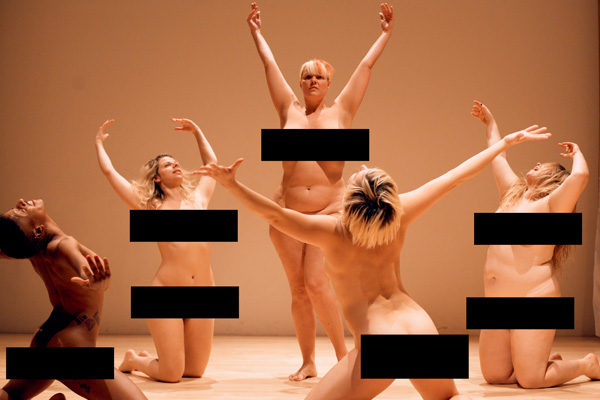
Photo: Blaine Davis, courtesy of the Museum of Contemporary Art
Five of the artists in Untitled Feminist Show.
Get ready for a provocative performance, Chicago. Young Jean Lee, the Obie Award–winning playwright and director (pictured below), brings her Untitled Feminist Show to the Museum of Contemporary Art this weekend (get tickets and info here). The performance, featuring six nude artists who are almost completely silent, celebrates identity and unadorned beauty. Before the show goes up tonight, Lee talked to Chicago about the piece, the word feminism, and the men who just want to be attacked sometimes.

Can you describe what exactly the performance is?
It’s best described as a celebration of these six people on stage, all of whom have female coded bodies. I had never seen a show in which a bunch of performers of very different body types. I just wanted to see them nude, without any makeup, looking really fierce and amazing. I grew up being trained that women need makeup and hairstyling. So much of the aspirational woman is based on how you look. It's like that Dove soap campaign, where they showed real women in the ads. They were wearing mom jeans and were really frumpy. I just wanted to see people in female bodies being really fabulous in their unadorned, human state. I’ve got six people with the most charisma I could find. They are all superstars in their own right, and the show is them just being really, really powerful. And they’re all cycling through different gender roles and stereotypes, and celebrating every aspect of themselves.
Why is it called Untitled Feminist Show?
In our culture, if you’re born with a female body, there are still all of these things put on you that suggest that you’re less than human. The male perspective is the default for our culture. I’m putting people with female bodies on stage.
Some previews in town noted the use of the word feminist in the title and wondered if it would turn off audiences. What do you think?
We put feminist in the title precisely because we knew it was an unpopular word. That’s the only reason feminist is in the title. The show is feminist in the loosest sense of the word. It’s part of the much larger umbrella of all the things feminism could mean. But we wanted to put it in the title because the word has these scary and negative connotations. We knew the show was going to be really, really fun. It’s a real crowd-pleaser—it gets a lot of word of mouth, and we’re always packed. We wanted to associate that word with something really fun.
You’ve now been in New York, Seattle, and Berlin. What has the reaction to the show been in those other cities?
The reaction has been crazy so far. The audiences have gone bananas. Berlin wants us back a second time because the show was so successful there. But it’s polarizing. There are people who really hate this show, and the thing they hate most about it is the fact that it’s a celebration, and positive and joyous. There were a lot of people in New York, for example, who said if you’re going to do something feminist, it has to be aggressive and didactic. These male audience members said, this show isn’t aggressive enough. I came wanting to be attacked. I didn’t get attacked, so I don’t understand what the point of it is. And then there’s a certain type of dance person who gets really offended by the show—they say, how dare you make a movement show that does not really operate within the vocabulary of current modern dance? It’s very polarizing, this show. People either love it or hate it.
What do you say to those audience members, especially the male ones?
I would just say, that’s not what I wanted to do with this show. I didn’t want to attack people. If you came in wanting to be attacked, I’m sorry. Their desires and my desires didn’t align.
How do you think Chicago will respond?
This is the big test. The show was very popular in New York, but it’s like the people who get the angriest about the show are the theater people who are very invested in a certain idea of what theater and dance should be. I know Chicago is a big theater town. My guess is it will be similar in response to New York, where it has this mass audience appeal and people like it, but then there’s this highly skeptical contingent of people who are like, this is not what I wanted it to be.
I’ve heard there’s some audience participation in the show.
I’m not going to talk about that! I want that to be a surprise.


